考研英语语法考点详解 连词辨析(because,since,as和for)
- 格式:docx
- 大小:17.63 KB
- 文档页数:5
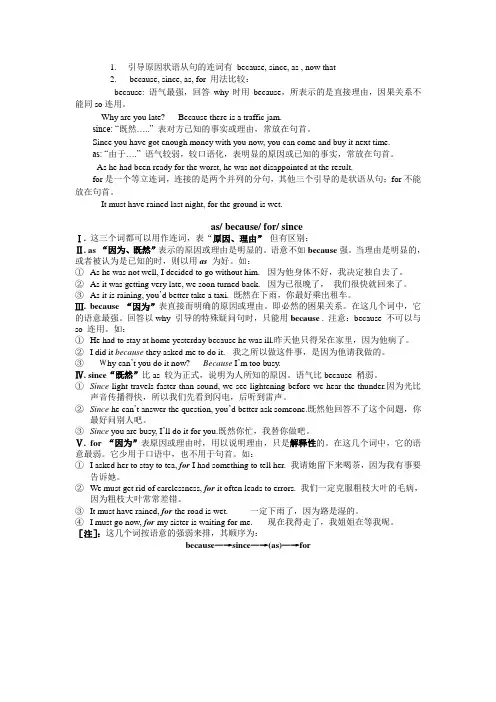
1.引导原因状语从句的连词有because, since, as , now that2. because, since, as, for 用法比较:because: 语气最强,回答why时用because,所表示的是直接理由,因果关系不能同so连用。
Why are you late? Because there is a traffic jam.since: “既然…..” 表对方已知的事实或理由,常放在句首。
Since you have got enough money with you now, you can come and buy it next time.as: “由于….” 语气较弱,较口语化,表明显的原因或已知的事实,常放在句首。
As he had been ready for the worst, he was not disappointed at the result.for是一个等立连词,连接的是两个并列的分句,其他三个引导的是状语从句;for不能放在句首。
It must have rained last night, for the ground is wet.as/ because/ for/ sinceⅠ. 这三个词都可以用作连词,表“原因、理由”但有区别:Ⅱ. as “因为、既然”表示的原因或理由是明显的。
语意不如because强。
当理由是明显的,或者被认为是已知的时,则以用as 为好。
如:①As he was not well, I decided to go without him. 因为他身体不好,我决定独自去了。
②As it was getting very late, we soon turned back. 因为已很晚了,我们很快就回来了。
③As it is raining, you’d better take a taxi. 既然在下雨,你最好乘出租车。
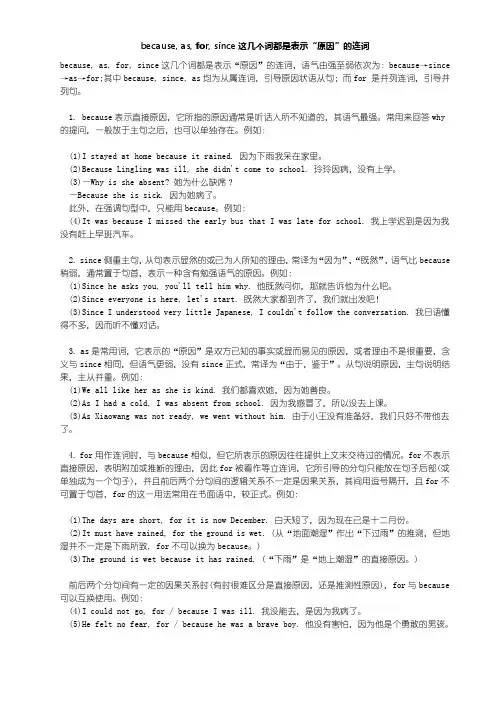
because, as, for, since这几个词都是表示“原因”的连词because, as, for, since这几个词都是表示“原因”的连词,语气由强至弱依次为:because→since →as→for;其中because, since, as均为从属连词,引导原因状语从句;而for 是并列连词,引导并列句。
1. because表示直接原因,它所指的原因通常是听话人所不知道的,其语气最强。
常用来回答why 的提问,一般放于主句之后,也可以单独存在。
例如:(1)I stayed at home because it rained. 因为下雨我呆在家里。
(2)Because Lingling was ill, she didn't come to school. 玲玲因病,没有上学。
(3)—Why is she absent? 她为什么缺席?—Because she is sick. 因为她病了。
此外,在强调句型中,只能用because。
例如:(4)It was because I missed the early bus that I was late for school. 我上学迟到是因为我没有赶上早班汽车。
2. since侧重主句,从句表示显然的或已为人所知的理由,常译为“因为”、“既然”,语气比because 稍弱,通常置于句首,表示一种含有勉强语气的原因。
例如:(1)Since he asks you, you'll tell him why. 他既然问你,那就告诉他为什么吧。
(2)Since everyone is here, let's start. 既然大家都到齐了,我们就出发吧!(3)Since I understood very little Japanese, I couldn't follow the conversation. 我日语懂得不多,因而听不懂对话。
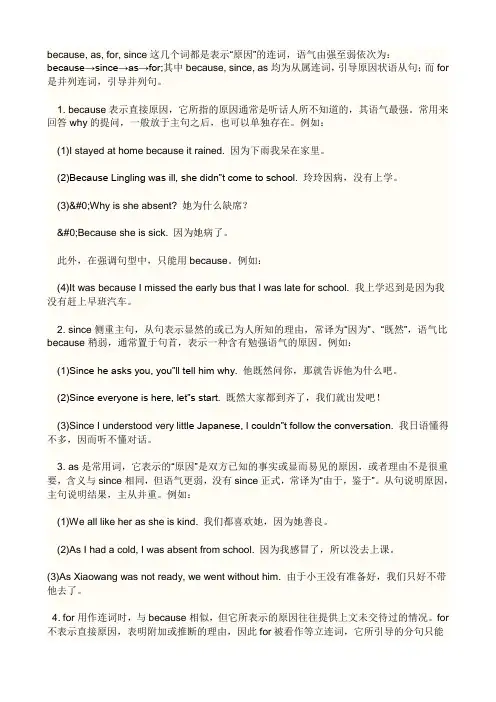
because, as, for, since这几个词都是表示“原因”的连词,语气由强至弱依次为:because→since→as→for;其中because, since, as均为从属连词,引导原因状语从句;而for 是并列连词,引导并列句。
1. because表示直接原因,它所指的原因通常是听话人所不知道的,其语气最强。
常用来回答why的提问,一般放于主句之后,也可以单独存在。
例如:(1)I stayed at home because it rained. 因为下雨我呆在家里。
(2)Because Lingling was ill, she didn”t come to school. 玲玲因病,没有上学。
(3)�Why is she absent? 她为什么缺席?�Because she is sick. 因为她病了。
此外,在强调句型中,只能用because。
例如:(4)It was because I missed the early bus that I was late for school. 我上学迟到是因为我没有赶上早班汽车。
2. since侧重主句,从句表示显然的或已为人所知的理由,常译为“因为”、“既然”,语气比because稍弱,通常置于句首,表示一种含有勉强语气的原因。
例如:(1)Since he asks you, you”ll tell him why. 他既然问你,那就告诉他为什么吧。
(2)Since everyone is here, let”s start. 既然大家都到齐了,我们就出发吧!(3)Since I understood very littl e Japanese, I couldn”t follow the conversation. 我日语懂得不多,因而听不懂对话。
3. as是常用词,它表示的“原因”是双方已知的事实或显而易见的原因,或者理由不是很重要,含义与since相同,但语气更弱,没有since正式,常译为“由于,鉴于”。
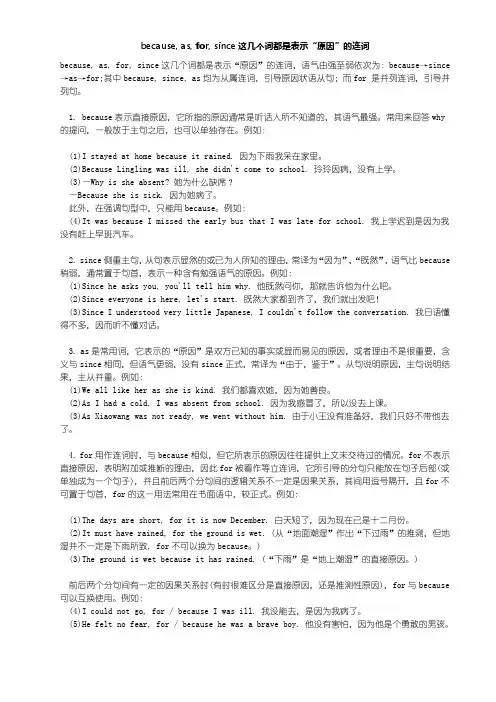
because, as, for, since这几个词都是表示“原因”的连词because, as, for, since这几个词都是表示“原因”的连词,语气由强至弱依次为:because→since →as→for;其中because, since, as均为从属连词,引导原因状语从句;而for 是并列连词,引导并列句。
1. because表示直接原因,它所指的原因通常是听话人所不知道的,其语气最强。
常用来回答why 的提问,一般放于主句之后,也可以单独存在。
例如:(1)I stayed at home because it rained. 因为下雨我呆在家里。
(2)Because Lingling was ill, she didn't come to school. 玲玲因病,没有上学。
(3)—Why is she absent? 她为什么缺席?—Because she is sick. 因为她病了。
此外,在强调句型中,只能用because。
例如:(4)It was because I missed the early bus that I was late for school. 我上学迟到是因为我没有赶上早班汽车。
2. since侧重主句,从句表示显然的或已为人所知的理由,常译为“因为”、“既然”,语气比because 稍弱,通常置于句首,表示一种含有勉强语气的原因。
例如:(1)Since he asks you, you'll tell him why. 他既然问你,那就告诉他为什么吧。
(2)Since everyone is here, let's start. 既然大家都到齐了,我们就出发吧!(3)Since I understood very little Japanese, I couldn't follow the conversation. 我日语懂得不多,因而听不懂对话。

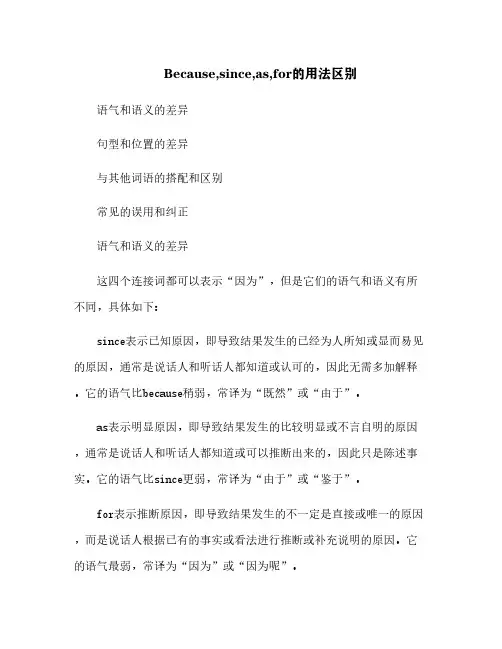
Because,since,as,for的用法区别语气和语义的差异句型和位置的差异与其他词语的搭配和区别常见的误用和纠正语气和语义的差异这四个连接词都可以表示“因为”,但是它们的语气和语义有所不同,具体如下:since表示已知原因,即导致结果发生的已经为人所知或显而易见的原因,通常是说话人和听话人都知道或认可的,因此无需多加解释。
它的语气比because稍弱,常译为“既然”或“由于”。
as表示明显原因,即导致结果发生的比较明显或不言自明的原因,通常是说话人和听话人都知道或可以推断出来的,因此只是陈述事实。
它的语气比since更弱,常译为“由于”或“鉴于”。
for表示推断原因,即导致结果发生的不一定是直接或唯一的原因,而是说话人根据已有的事实或看法进行推断或补充说明的原因。
它的语气最弱,常译为“因为”或“因为呢”。
举例说明:I stayed at home because itrned.(我呆在家里是因为下雨了。
)这里because表示下雨是我呆在家里的直接原因,可能是听话人不知道下雨了,所以需要解释。
Since you are so busy, I won't bother you anymore.(既然你这么忙,我就不再打扰你了。
)这里since表示你很忙是我不再打扰你的已知原因,可能是说话人和听话人都知道你很忙,所以无需多说。
As he is a teacher, he knows alot.(由于他是老师,他知道很多。
)这里as表示他是老师是他知道很多的明显原因,可能是说话人和听话人都认为老师知道很多,所以只是陈述事实。
He must be ill, for he lookspale.(他一定生病了,因为他看起来很苍白。
)这里for表示他看起来很苍白是他生病了的推断原因,可能是说话人根据他苍白的面色进行推测或补充说明。
句型和位置的差异这四个连接词在句型和位置上也有一些差异,具体如下:because为从属连词,引导原因状语从句,从句可以放在主句之前或之后,但如果放在主句之前,则要用逗号隔开;如果单独存在,则要用冒号引出。
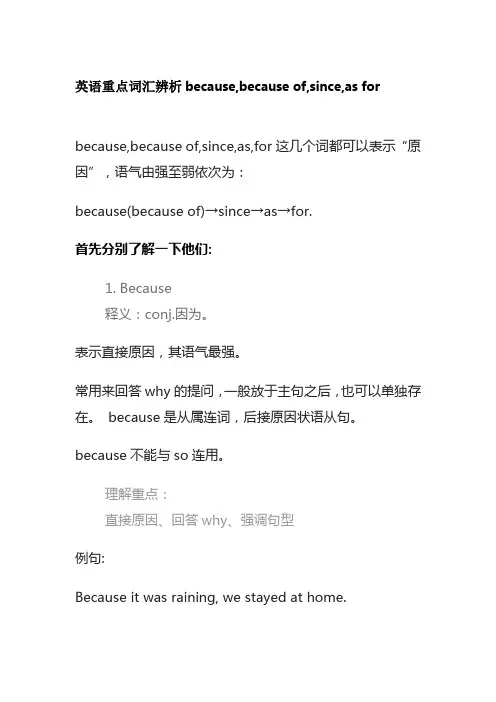
英语重点词汇辨析because,because of,since,as forbecause,because of,since,as,for这几个词都可以表示“原因”,语气由强至弱依次为:because(because of)→since→as→for.首先分别了解一下他们:1. Because释义:conj.因为。
表示直接原因,其语气最强。
常用来回答why的提问,一般放于主句之后,也可以单独存在。
because是从属连词,后接原因状语从句。
because不能与so连用。
理解重点:直接原因、回答why、强调句型例句:Because it was raining, we stayed at home.因为下雨,所以我们得呆在家里。
Why you choose this sport?你为什么选择这项运动?He left because he didn't want to be tagged as a soap star.他之所以离开是因为他不想被人称作是肥皂剧明星。
2.Because of释义:conj.因为,由于(说明)表示直接原因,其语气最强。
because of是个介词短语,不可以引导原因状语从句,而应该接名词、代词、动词的ing形式或者名词性从句等。
理解重点:直接原因例句:Because of my country accent, people identified me with a homely farmer's wife.由于我的乡下口音,人们将我等同于平常的农妇。
The team might be seeded because of their pull within soccer's international body.凭其在国际足球机构的影响力,该队有可能被定为种子队。
Many quite reasonable people were at panic stations because of popular unrest.许多相当理智的人由于普遍的不安情绪也处于紧张状态。
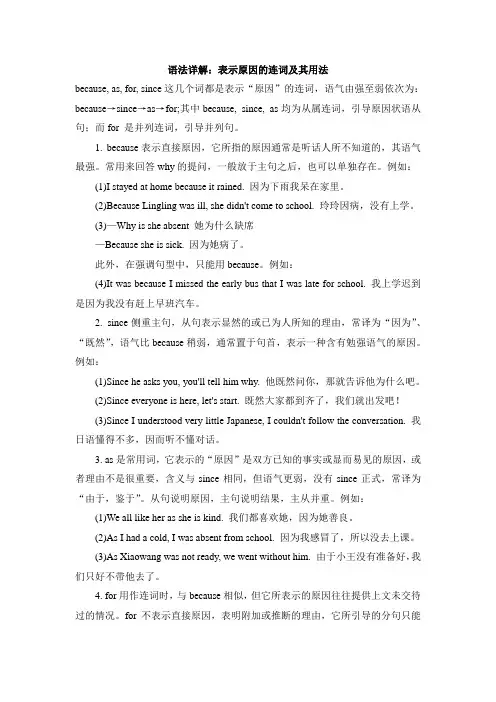
语法详解:表示原因的连词及其用法because, as, for, since这几个词都是表示“原因”的连词,语气由强至弱依次为:because→since→as→for;其中because, since, as均为从属连词,引导原因状语从句;而for 是并列连词,引导并列句。
1. because表示直接原因,它所指的原因通常是听话人所不知道的,其语气最强。
常用来回答why的提问,一般放于主句之后,也可以单独存在。
例如:(1)I stayed at home because it rained. 因为下雨我呆在家里。
(2)Because Lingling was ill, she didn't come to school. 玲玲因病,没有上学。
(3)—Why is she absent 她为什么缺席—Because she is sick. 因为她病了。
此外,在强调句型中,只能用because。
例如:(4)It was because I missed the early bus that I was late for school. 我上学迟到是因为我没有赶上早班汽车。
2. since侧重主句,从句表示显然的或已为人所知的理由,常译为“因为”、“既然”,语气比because稍弱,通常置于句首,表示一种含有勉强语气的原因。
例如:(1)Since he asks you, you'll tell him why. 他既然问你,那就告诉他为什么吧。
(2)Since everyone is here, let's start. 既然大家都到齐了,我们就出发吧!(3)Since I understood very little Japanese, I couldn't follow the conversation. 我日语懂得不多,因而听不懂对话。
3. as是常用词,它表示的“原因”是双方已知的事实或显而易见的原因,或者理由不是很重要,含义与since相同,但语气更弱,没有since正式,常译为“由于,鉴于”。
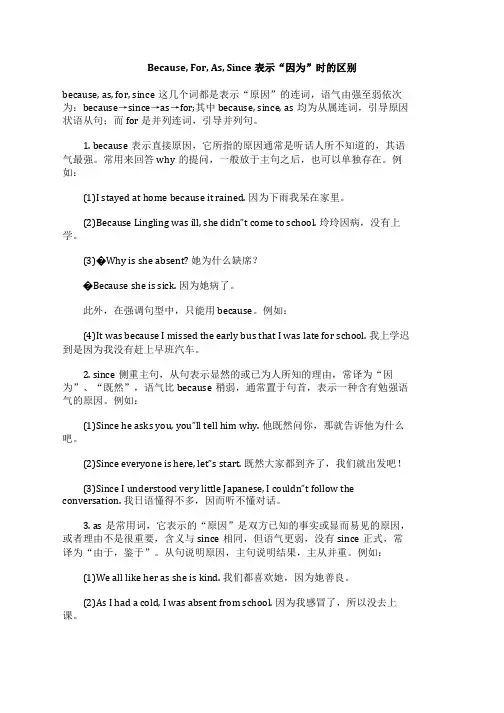
Because, For, As, Since表示“因为”时的区别because, as, for, since这几个词都是表示“原因”的连词,语气由强至弱依次为:because→since→as→for;其中because, since, as均为从属连词,引导原因状语从句;而for 是并列连词,引导并列句。
1. because表示直接原因,它所指的原因通常是听话人所不知道的,其语气最强。
常用来回答why的提问,一般放于主句之后,也可以单独存在。
例如:(1)I stayed at home because it rained. 因为下雨我呆在家里。
(2)Because Lingling was ill, she didn”t come to school.玲玲因病,没有上学。
(3)�Why is she absent? 她为什么缺席?�Because she is sick. 因为她病了。
此外,在强调句型中,只能用because。
例如:(4)It was because I missed the early bus that I was late for school. 我上学迟到是因为我没有赶上早班汽车。
2. since侧重主句,从句表示显然的或已为人所知的理由,常译为“因为”、“既然”,语气比because稍弱,通常置于句首,表示一种含有勉强语气的原因。
例如:(1)Since he asks you, you”ll tell him why.他既然问你,那就告诉他为什么吧。
(2)Since everyone is here, let”s start.既然大家都到齐了,我们就出发吧!(3)Since I understo od very little Japanese, I couldn”t follow the conversation. 我日语懂得不多,因而听不懂对话。
3. as是常用词,它表示的“原因”是双方已知的事实或显而易见的原因,或者理由不是很重要,含义与since相同,但语气更弱,没有since正式,常译为“由于,鉴于”。
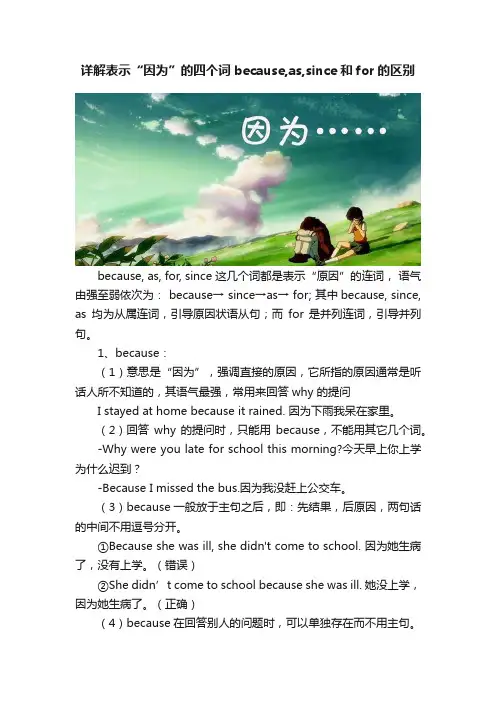
详解表示“因为”的四个词because,as,since和for的区别because, as, for, since 这几个词都是表示“原因”的连词,语气由强至弱依次为:because→ since→as→ for; 其中because, since, as均为从属连词,引导原因状语从句;而for 是并列连词,引导并列句。
1、because:(1)意思是“因为”,强调直接的原因,它所指的原因通常是听话人所不知道的,其语气最强,常用来回答why 的提问I stayed at home because it rained. 因为下雨我呆在家里。
(2)回答why的提问时,只能用because,不能用其它几个词。
-Why were you late for school this morning?今天早上你上学为什么迟到?-Because I missed the bus.因为我没赶上公交车。
(3)because一般放于主句之后,即:先结果,后原因,两句话的中间不用逗号分开。
①Because she was ill, she didn't come to school. 因为她生病了,没有上学。
(错误)②She didn’t come to school because she was ill. 她没上学,因为她生病了。
(正确)(4)because在回答别人的问题时,可以单独存在而不用主句。
-Why is she absent? 她为什么缺席?-Because she is sick. 因为她病了。
(没有主句)(5)在强调句型中,只能用because,而不能用其它几个词:It was because I missed the early bus that I was late for school. 我上学迟到是因为我没有赶上早班汽车。
(6)because不能与so连用:Because Tom got up late, so he was late for school. 因为汤姆起床晚了,所以他上学迟到了。
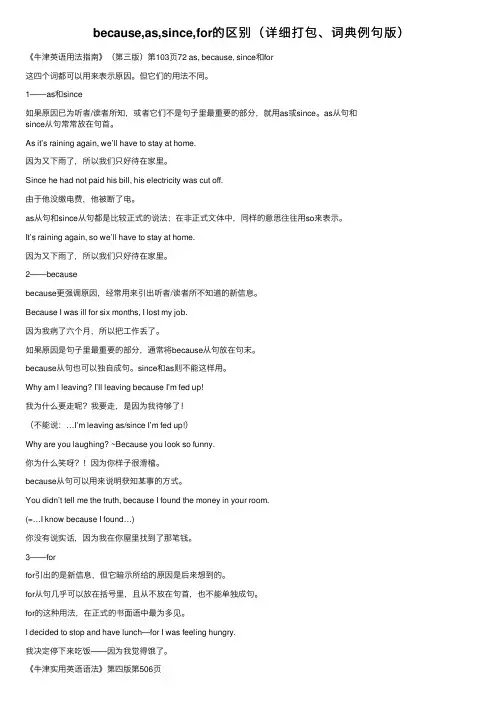
because,as,since,for的区别(详细打包、词典例句版)《⽜津英语⽤法指南》(第三版)第103页72 as, because, since和for这四个词都可以⽤来表⽰原因。
但它们的⽤法不同。
1——as和since如果原因已为听者/读者所知,或者它们不是句⼦⾥最重要的部分,就⽤as或since。
as从句和since从句常常放在句⾸。
As it’s raining again, we’ll have to stay at home.因为⼜下⾬了,所以我们只好待在家⾥。
Since he had not paid his bill, his electricity was cut off.由于他没缴电费,他被断了电。
as从句和since从句都是⽐较正式的说法;在⾮正式⽂体中,同样的意思往往⽤so来表⽰。
It’s raining again, so we’ll have to stay at home.因为⼜下⾬了,所以我们只好待在家⾥。
2——becausebecause更强调原因,经常⽤来引出听者/读者所不知道的新信息。
Because I was ill for six months, I lost my job.因为我病了六个⽉,所以把⼯作丢了。
如果原因是句⼦⾥最重要的部分,通常将because从句放在句末。
because从句也可以独⾃成句。
since和as则不能这样⽤。
Why am l leaving? I’ll leaving because I’m fed up!我为什么要⾛呢?我要⾛,是因为我待够了!(不能说:…I’m leaving as/since I’m fed up!)Why are you laughing? ~Because you look so funny.你为什么笑呀?!因为你样⼦很滑稽。
because从句可以⽤来说明获知某事的⽅式。
You didn’t tell me the truth, because I found the money in your room.(=…I know because I found…)你没有说实话,因为我在你屋⾥找到了那笔钱。
for ,because, as, since这四个词作为连词,都有"因为"的意思,但它们在用法上有区别:because是从属连词,接表示直接原因的从句,一般放在主句的后面,也可放在主句前面,它表示的语气最强,在回答why的问句时,必须用because。
例如:The swimming pool won't be open today because they're making repairs.游泳池今天不开放,因为他们在修理。
Why did you move to France? 你们为什么搬到法国?Because my father found work in Paris. 因为我父亲在巴黎找到了工作。
注意:在英语中用了because后,不可再用so。
as是从属连词,说明一般的因果关系,语气比because弱,说明比较明显的原因,它引导的从句通常放在句首,有时也可放在句末。
例如:As it is raining, you'd better take a taxi.天下雨了,你最好乘出租车。
since 意为"既然, 由于",表示对方已知的无需加以说明的原因或事实,语气比because弱,但是比as 强。
例如:Since we have no money, we can't buy that vase.既然我们没钱,我们就不能买那花瓶。
Since everybody is here, let's begin our party.既然大家都到了,那就开始我们的聚会吧!since, as 都是不讲自明的原因,是已知的原因.for 是并列连词,用来附带解释说明前一句的原因或理由,for引导的并列句,一般放在所要说明的句子的后面。
for 语气较轻,表示非客观必然的原因,是主观可改变结果的原因,甚至是猜测可能的原因:。
for 不能放句首,它是并列连词.例如:I went to see him, for I had something to tell him.我去见他,因为我有事要告诉他。
Because,since,as,for的用法区别作为自然语言处理机器人,我将在下文中为大家详细介绍"Because, since, as, for"这四个单词的用法区别。
首先,我们需要明确的是,这四个词都是用来表示原因的连词,它们都可以将一句话中的两个部分连接起来,形成因果关系。
然而,它们之间还是有不同的用法和适用场景的。
1. Because"Because"是最常用的表达原因的连词,它的作用是直接说明前面的部分是后面的原因。
例如:- I didn't go to school today because I was sick.在这个例子中,因为前面的部分是“我今天没有去学校”,而后面的部分是“我生病了”,我们可以明显地看到二者之间的因果关系。
然而,需要注意的是,因为“because”的语气比较直接,有时候会带有过于强烈的语气。
因此,在写作中,为了语气更加稳妥,有时候我们也可以使用其他替代词。
2. Since"Since"的作用和"Because"非常类似,也是用来表达一种因果关系。
但是与"Because"不同的是,"Since"更加强调已经发生过的事情,它更适用于描述一个过去的事件和它对现在的影响。
例如:- Since I quit smoking, I've felt much healthier.在这个例子中,我们可以看到前面的事件是“我戒烟了”,而后面的结果是“我的健康状态变得更好了”。
"Since"的用法相当于是在强调戒烟这一事件对现在的影响。
需要注意的是,"Since"也可以表示时间的含义,因此在有些情况下,可能会存在歧义。
例如:- Since we arrived early, we had plenty of time to explore the city.这个例子中的"Since"指的是时间,也就是意味着“因为我们早到了,我们有足够的时间去探索这个城市”。
Because,since,as,for的用法区别一、becausebecause是最常用的表示原因或者解释的连词,它可以连接两个完整的句子,也可以连接一个句子和一个短语。
because后面的从句通常是已知的或者明显的原因,而主句则是需要解释的结果或者判断。
例如:He stayed at home because he wassick.(他呆在家里,因为他生病了。
)She was late because of thetraffic.(她因为交通阻塞而迟到了。
)注意:because不能用于表示目的或者意图,也不能用于否定句中表示意外或者出乎意料的结果。
例如:He studied hard in order to pass theexam.(他努力学习,为了通过考试。
)(不能用because)She didn't go to the party, even though she wasinvited.(她没有去参加聚会,尽管她被邀请了。
)(不能用because )二、sincesince也可以用来表示原因或者解释,但是它比because更正式,而且更强调从句中的原因是已经存在的、公认的或者不容置疑的事实。
例如:He must be rich, since he can afford such a luxurycar.(他一定很富有,因为他能买得起这么豪华的汽车。
)Since you are here, you might as well stay fordinner.(既然你来了,你不妨留下来吃晚饭。
)注意:since也可以用来表示时间,意思是“自从……以来”,这时它可以放在句首或者句中,但是要注意时态的变化。
例如:I haven't seen him since he moved to anothercity.(自从他搬到另一个城市后,我就没见过他了。
)Since I graduated from college, I have been working as a teacher.(自从我大学毕业后,我向来在做老师。
Because, as, for, since的区别Because, as, for, since这几个词都是表示“原因”的连词,语气强弱依次为:because>since>as>>for;其中because, since, as均为从属连词(这里指用于引出直接或根本原因),引导原因状语从句;而for是并列连词(这里指用于引出非直接或根本原因),引导并列句。
并列连词[for]:这里指用于引出非直接原因或表可能性推断的连词the ground is wet ≈>(表可能)it rained last night从属连词[because, since, as]:这里指用于引出比较直接的原因或表必然性推断的连词it rained last night =>(表确定)the ground is wet语气强弱的界定/意义:强→弱直接原因非直接原因肯定性(一定因为…)不确定性(可能因为…)强调原因(从句)强调结果(主句)❶ because表示“因为”,用来表示最直接的因果关系或是听话人所不知道的原因,它所表达的语气是这四个词中最为强烈的,它所引导的原因状语从句一般(95%)要放在主句之后。
例如:(1)I stayed at home because it rained. 因为下雨我呆在家里。
(2)Because Lingling was ill, she didn’t come to school. 玲玲因病,没有上学。
(注: 以下两种情况只能用because来回答:1、用why来提问的特殊疑问句的回答,只能用because;He didn’t attend the meeting because he had too much work to do.2、在强调句中,只能用because。
It is because it rained last week that they put off the match.)❷for用作连词时,与because相似,用于引出非直接原因,表明可能性的推断或因果关系较弱的附加信息,因此for被看作并列连词。
考研英语语法考点详解连词辨析(because,since,as和for)
because、since、as和for均可表示“原因”,其中because、since 和as均为从属连词,用于引导原因状语从句,而for为并列连词,用于连接并列句。
1.从属连词because强调直接原因,所指原因通常是听话人所不知道或最感兴趣的,语气最强,通常置于主句后,用于回答why引出的问题。
because引导的原因状语从句往往比主句显得更重要。
例如:
•I prefer classical music because it makes me feel relaxed.
我更喜欢古典音乐,因为它令我感到放松。
•It’s about the now and what one contributes to the now, because reading is a give and take between author and reader. 阅读是作者和读者之间的一种给予与索取,因此它与当下以及一个人对当下的贡献有关。
2.从属连词since语气较because弱,常表示已知的、显然的理由,常译为“既然”。
since引导的从句通常置于主句之前,重点强调主句的内容,相当于now (that)。
例如:
•Since you have repaired my TV set, there is no need for me to buy a new one. 既然你把我的电视机修好了,我就没有必要买新的了。
•We thought that, since we were in the area, we’d stop by and see them. 我们想,既然到了这个地方,就该顺便去看看他们。
3.从属连词as引导原因状语从句时,表示双方已知的事实或显而易见的原因,用法与since大致相同,但语气更弱,没有since正式。
例如:
•I don’t enjoy watching TV with my brother as he always switches over to the programs that he wants to watch. 我不喜欢和我弟弟一起看电视,因为他总是切换到他想看的节目。
•They have real impacts, as they result in misguided use of scarce resources. 它们产生了实际的影响,因为它们导致了稀缺资源被错误使用。
4.并列连词for表原因时,不表示第一个分句行为的直接原因,只是提供一些补充说明,且for连接的第二个分句不可置于第一个分句前。
例如:
•Now I am proud to show visitors over the prison, for I helped to make our people free in their own land. 现在,我很自豪地领来访者参观监狱,因为我帮助我们的人民在自己的土地上获得了自由。
•Nowadays, there is a sharp increase in children’s creativity, for they are greatly encouraged to develop their talents. 如今,孩子们的创造力有了极大的提高,因为他们受到极大的鼓励去发展自己的才能。
so…that...中的so为副词,其后跟形容词或副词;而such...that...中的such为形容词,其后接名词(短语),它们的结构分别为:
1.so+形容词/副词+that从句;例如:
I was so upset that I almost cried. 我难过得几乎哭了出来。
It was raining so hard that we couldn’t help wondering how long it would take to get there.雨下得太大了,以至于我们不禁想知道还要多久才能到达那里。
2.so+形容词+a/an+可数名词单数+that从句;例如:
He is so clever a boy that all his teachers like him. 他是一个很聪明的男孩,以至于所有的老师都喜欢他。
It is so interesting a film that we all want to see it again. 这是一部如此有趣的电影,以至于我们都想再看一遍。
3.such+a/an+形容词+可数名词单数+that从句;例如:
He came to such a sudden stop that we almost hit him. 他突然停下来,以至于我们差点儿撞到他。
A company showed a new voice technology able to produce such a convincing human-sounding voice that it was able to speak to a receptionist. 一家公司展示了一种新的语音技术,该技术能够产生令人信服的人声,从而可以与接待员通话。
4.such+形容词+可数名词复数/不可数名词+that从句;例如:
Slave ships carried slaves over from Africa, keeping them in such terrible conditions that many died during the long sea journey. 奴隶船把奴隶从非洲运过来,让他们处在非常恶劣的条件下,以致许多人在漫长的海上旅程中死去。
It was such loud music that we couldn’t hear ourselves speak. 音乐太吵了,以致我们听不见自己说话。
1.till与until用于引导时间状语从句,意为“直到……为止”。
当主句为肯定句时,谓语动词须用延续性动词,表示主句的动作一直延续到till/until所表示的时间为止; 当主句为否定句时,谓语动词须用非延续性动词,表示主句的动作到till/until所表示的时间才发生。
例如:
•Wait till you are old enough, dear. 等你长大了再说吧,亲爱的。
•I did not realize schools in the UK are so different from schools in China until I read your article. 直到我读了你的文章,我才意识到英国的学校和中国的学校有这么大的不同。
2.until可置于句首,而till通常置于句中。
例如:
•Until we do that, nothing else will change! 如果我们不那样做,那么什么都不会改变!
•She continued working to help improve the lives of poor prisoners till she died. 直到去世,她一直致力于帮助改善贫困囚犯们的生活。
3.当主句为否定句时,until可与否定词not共同构成“not...until...”结构,且not until可用于强调句型中。
例如:
•We don’t know how much we depend on them until we don’t have them. 直到失去他们,我们才知道我们有多依赖他们。
•It was not until the early 1950s that most tape recorders began using plastic tape as they do today. 直到20世纪50年代早期,大多数录音机才像现在这样使用塑料磁带。